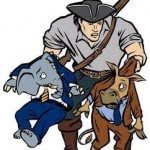
Calvin Coolidge is one of America's least appreciated and most misunderstood Presidents. The fact that he didn't love the sound of his own voice as much as Theodore Roosevelt, Woodrow Wilson, or Franklin Roosevelt is somehow seen as a blight on his intelligence. That says more about the historians who derive this conclusion. They confuse motion and noise with intellect and comprehension. The truth is that Coolidge was one of the most astute Presidents on the 20th century and had a genuine respect and reverence for the ideals that the United States of America was built upon.
Coolidge gave a speech in Philadelphia in 1926 on the occasion of the 150th anniversary of the Declaration of Independence that I believe is the greatest statement any President has ever made in reference to our republic's foundations. Remember, Coolidge was President in a decade that followed a questionable war and a series of federal usurpations in the name of "Progressivism." Silent Cal reminded everyone that principles do not change with circumstances and deviations from our bedrock ideals is regressive rather than progressive. This passage is from the last part of the speech:
Coolidge gave a speech in Philadelphia in 1926 on the occasion of the 150th anniversary of the Declaration of Independence that I believe is the greatest statement any President has ever made in reference to our republic's foundations. Remember, Coolidge was President in a decade that followed a questionable war and a series of federal usurpations in the name of "Progressivism." Silent Cal reminded everyone that principles do not change with circumstances and deviations from our bedrock ideals is regressive rather than progressive. This passage is from the last part of the speech:
Governments do not make ideals, but ideals make governments. This is both historically and logically true. Of course the government can help to sustain ideals and can create institutions through which they can be the better observed, but their source by their very nature is in the people. The people have to bear their own responsibilities. There is no method by which that burden can be shifted to the government.It is not the enactment, but the observance of laws, that creates the character of a nation.
About the Declaration there is a finality that is exceedingly restful. It is often asserted that the world has made a great deal of progress since 1776, that we have had new thoughts and new experiences which have given us a great advance over the people of that day, and that we may therefore very well discard their conclusions for something more modern. But that reasoning can not be applied to this great charter. If all men are created equal, that is final. If they are endowed with inalienable rights, that is final. If governments derive their just powers from the consent of the governed, that is final. No advance, no progress can be made beyond these propositions. If anyone wishes to deny their truth or their soundness, the only direction in which he can proceed historically is not forward, but backward toward the time when there was no equality, no rights of the individual, no rule of the people. Those who wish to proceed in that direction can not lay claim to progress. They are reactionary. Their ideas are not more modern, but more ancient, than those of the Revolutionary fathers...
...Under a system of popular government there will always be those who will seek for political preferment by clamoring for reform. While there is very little of this which is not sincere, there is a large portion that is not well informed. In my opinion very little of just criticism can attach to the theories and principles of our institutions. There is far more danger of harm than there is hope of good in any radical changes. We do need a better understanding and comprehension of them and a better knowledge of the foundations of government in general. Our forefathers came to certain conclusions and decided upon certain courses of action which have been a great blessing to the world. Before we can understand their conclusions we must go back and review the course which they followed. We must think the thoughts which they thought. Their intellectual life centered around the meeting-house. They were intent upon religious worship. While there were always among them men of deep learning, and later those who had comparatively large possessions, the mind of the people was not so much engrossed in how much they knew, or how much they had, as in how they were going to live. While scantily provided with other literature, there was a wide acquaintance with the Scriptures. Over a period as great as that which measures the existence of our independence they were subject to this discipline not only in their religious life and educational training, but also in their political thought. They were a people who came under the influence of a great spiritual development and acquired a great moral power.
No other theory is adequate to explain or comprehend the Declaration of Independence. It is the product of the spiritual insight of the people. We live in an age of science and of abounding accumulation of material things. These did not create our Declaration. Our Declaration created them. The things of the spirit come first. Unless we cling to that, all our material prosperity, overwhelming though it may appear, will turn to a barren sceptre in our grasp.If we are to maintain the great heritage which has been bequeathed to us, we must be like-minded as the fathers who created it. We must not sink into a pagan materialism. We must cultivate the reverence which they had for the things that are holy. We must follow the spiritual and moral leadership which they showed. We must keep replenished, that they may glow with a more compelling flame, the altar fires before which they worshiped.








No comments:
Post a Comment